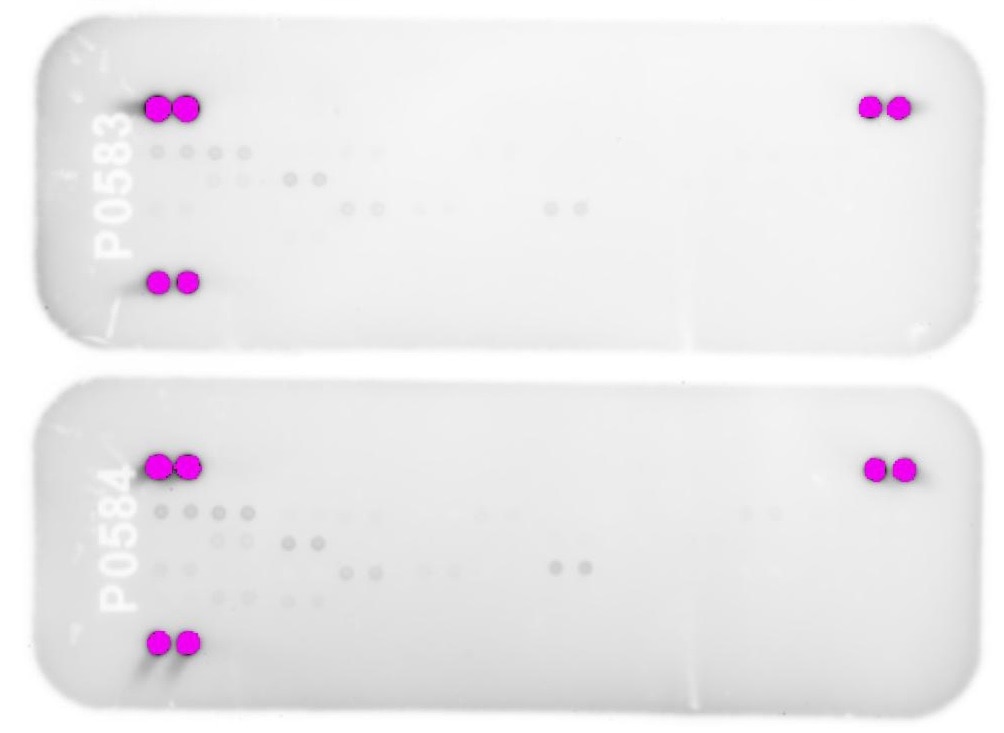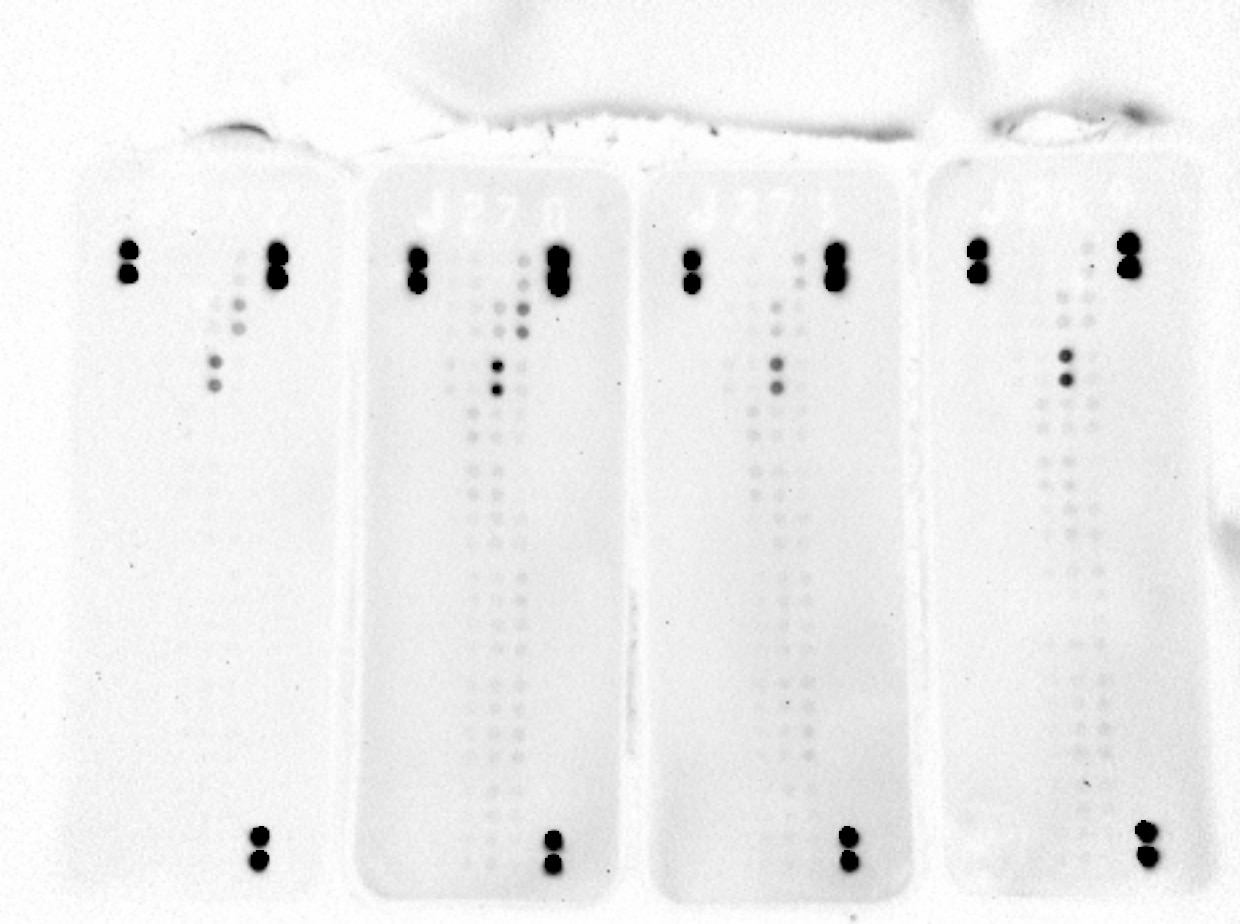Proteome Profiler Mouse Phospho-RTK Array Kit
Proteome Profiler Mouse Phospho-RTK Array Kit Summary
A membrane-based antibody array for the parallel determination of the relative levels of mouse receptor tyrosine kinase phosphorylation. Validated for analyte detection in cell lysates.
Key Benefits
- Detects phosphorylation of 39 mouse receptors simultaneously
- Requires no specialized equipment
Principle of the Assay
The Proteome Profiler Mouse Phospho-RTK Array Kit is a membrane-based sandwich immunoassay. Capture antibodies spotted in duplicate on nitrocellulose membranes bind to specific target proteins present in the sample (Step 1). Tyrosine phosphorylation of the captured proteins is detected with an HRP-conjugated pan phospho-tyrosine antibody (Step 2) and then visualized using chemiluminescent detection reagents (Step 3). The signal produced is proportional to the amount phosphorylation in the bound analyte.
Why Use an Antibody Array to Detect Receptor Phosphorylation?
Determining the phosphorylation of multiple receptors in a single sample can be expensive, time consuming and can require specialized equipment. Performing multiple immunoprecipitations and Western blots requires time, labor, and reagents. The use of a multiplex antibody array to detect multiple phosphorylations in a single sample can be cost-effective and also save time and sample.
- 4 Array Membranes
- 4-Well Multi-dish
- Array Buffers
- Lysis Buffer
- Wash Buffer
- Anti-Phospho-Tyrosine-HRP Detection Antibody
- Chemiluminescent Detection Reagents
- Transparency Overlay Template
- Detailed Protocol
For a complete list of the kit contents and necessary materials, please see the Materials Provided/Other Supplies Required sections of the product datasheet.
Stability and Storage
Store the unopened kit at 2 °C to 8 °C. Do not use past kit expiration date.
| Simultaneously detect the relative phosphorylation of these RTKs in a single sample | ||
| EGF R | PDGF R alpha | VEGF R3 |
| ErbB2 | PDGF R beta | MuSK |
| ErbB3 | SCF R | EphA1 |
| ErbB4 | Flt-3 | EphA2 |
| FGF R2 (IIIc) | M-CSF R | EphA3 |
| FGF R3 | c-Ret | EphA6 |
| FGF R4 | Tie-1 | EphA7 |
| Insulin R | Tie-2 | EphA8 |
| IGF-I R | TrkA | EphB1 |
| Axl | TrkB | EphB2 |
| DtK | TrkC | EphB4 |
| Mer | VEGF R1 | EphB6 |
| HGF R | VEGF R2 | |
| MSP R | ||
Assays for analytes represented in the Mouse Phospho-Receptor Tyrosine Kinase Array Kit
| DuoSet® ELISA Development Reagents | DuoSet® IC ELISA Development Reagents (Total) | DuoSet® IC ELISA Development Reagents (Phospho) | Quantikine® ELISA Kits | Cell-based ELISA Kits | |
| EGF R | |||||
| ErbB2 | |||||
| ErbB3 | |||||
| ErbB4 | |||||
| FGF R2 (IIIc) | |||||
| FGF R3 | |||||
| FGF R4 | |||||
| Insulin R | |||||
| IGF-I R | |||||
| Axl | DY854 | ||||
| DtK | DY759 | ||||
| Mer | DY591 | ||||
| HGF R | DY527 | ||||
| MSP R | |||||
| PDGF R alpha | |||||
| PDGF R beta | |||||
| SCF R | |||||
| Flt-3 | |||||
| M-CSF R | |||||
| c-Ret | |||||
| Tie-1 | |||||
| Tie-2 | DYC2816 | ||||
| TrkA | |||||
| TrkB | |||||
| TrkC | |||||
| VEGF R1 | DY471 | MVR100 | |||
| VEGF R2 | DY1558B | MVR200B | |||
| VEGF R3 | DY743 | ||||
| MuSK | |||||
| EphA1 | |||||
| EphA2 | |||||
| EphA3 | |||||
| EphA6 | |||||
| EphA7 | |||||
| EphA8 | |||||
| EphB1 | |||||
| EphB2 | |||||
| EphB4 | |||||
| EphB6 |
Specifications
Product Datasheets
Customers also Viewed
Scientific Data
 View Larger
View Larger
Detection of Multiple Tyrosine Phosphorylated Receptors in Cell Lysates by the Mouse Phospho-RTK Array. The amount of lysate incubated with each array is indicated in the figure. Data shown are from 2 minute (Panels A, B, and C) or 5 minute (Panel D) exposure to X-ray film.A. M1 mouse myeloid leukemia cells were either untreated or treated with 500 ng/mL recombinant mouse Flt-3 Ligand (Catalog # 427-FL) for 5 minutes.B. NMuMG mouse mammary gland epithelial cells were either untreated or treated with 200 ng/mL recombinant mouse EGF (Catalog # 2028-EG) for 5 minutes.C. Hepa 1-6 mouse hepatoma cells were either untreated or treated with 1 µg/mL recombinant human insulin (Sigma, Catalog # I9278).D. HEK293 human embryonic kidney cells transfected with mouse EphA1 were either untreated or treated with 3 µg/mL mouse Ephrin-A1 (Catalog # 602-A1) and 0.3 µg/mL goat anti-human IgG Fc (Catalog # G-102-C) for 20 minutes.
Citations for Proteome Profiler Mouse Phospho-RTK Array Kit
R&D Systems personnel manually curate a database that contains references using R&D Systems products. The data collected includes not only links to publications in PubMed, but also provides information about sample types, species, and experimental conditions.
41
Citations: Showing 1 - 10
Filter your results:
Filter by:
-
BioID-based intact cell interactome of the Kv1.3 potassium channel identifies a Kv1.3-STAT3-p53 cellular signaling pathway
Authors: Prosdocimi, E;Carpanese, V;Todesca, LM;Varanita, T;Bachmann, M;Festa, M;Bonesso, D;Perez-Verdaguer, M;Carrer, A;Velle, A;Peruzzo, R;Muccioli, S;Doni, D;Leanza, L;Costantini, P;Stein, F;Rettel, M;Felipe, A;Edwards, MJ;Gulbins, E;Cendron, L;Romualdi, C;Checchetto, V;Szabo, I;
Science advances 2024-09-06
-
Multifunctional Cell Regulation Activities of the Mussel Lectin SeviL: Induction of Macrophage Polarization toward the M1 Functional Phenotype
Authors: Fujii, Y;Kamata, K;Gerdol, M;Hasan, I;Rajia, S;Kawsar, SMA;Padma, S;Chatterjee, BP;Ohkawa, M;Ishiwata, R;Yoshimoto, S;Yamada, M;Matsuzaki, N;Yamamoto, K;Niimi, Y;Miyanishi, N;Konno, M;Pallavicini, A;Kawasaki, T;Ogawa, Y;Ozeki, Y;Fujita, H;
Marine drugs 2024-06-11
-
Blocking the angiopoietin-2-dependent integrin ?-1 signaling axis abrogates small cell lung cancer invasion and metastasis
Authors: Meder, L;Orschel, CI;Otto, CJ;Koker, M;Brägelmann, J;Ercanoglu, MS;Dähling, S;Compes, A;Selenz, C;Nill, M;Dietlein, F;Florin, A;Eich, ML;Borchmann, S;Odenthal, M;Blazquez, R;Hilberg, F;Klein, F;Hallek, M;Büttner, R;Reinhardt, HC;Ullrich, RT;
JCI insight 2024-05-22
-
Tumorigenesis driven by the BRAFV600E oncoprotein requires secondary mutations that overcome its feedback inhibition of migration and invasion
Authors: Gadal, S;Boyer, JA;Roy, SF;Outmezguine, NA;Sharma, M;Li, H;Fan, N;Chan, E;Romin, Y;Barlas, A;Chang, Q;Pancholi, P;Timaul, NM;Overholtzer, M;Yaeger, R;Manova-Todorova, K;de Stanchina, E;Bosenberg, M;Rosen, N;
bioRxiv : the preprint server for biology 2024-04-20
-
Osteoclast-derived extracellular vesicles are implicated in sensory neurons sprouting through the activation of epidermal growth factor signaling
Authors: E Neto, L Leitão, JC Mateus, DM Sousa, CJ Alves, M Aroso, AC Monteiro, F Conceição, ROC Oreffo, J West, P Aguiar, M Lamghari
Cell & bioscience, 2022-08-14;12(1):127. 2022-08-14
-
MAP3K4 promotes fetal and placental growth by controlling the receptor tyrosine kinases IGF1R/IR and Akt signaling pathway�
Authors: CH Perry, NA Mullins, RBA Sweileh, NAM Shendy, PA Roberto, AL Broadhurst, HA Nelson, GA Miranda-Ca, AN Abell
The Journal of Biological Chemistry, 2022-07-31;0(0):102310. 2022-07-31
-
EGFR/MET promotes hepatocellular carcinoma metastasis by stabilizing tumor cells and resisting to RTKs inhibitors in circulating tumor microemboli
Authors: S Song, Z Yu, Y You, C Liu, X Xie, H Lv, F Xiao, Q Zhu, C Qin
Cell Death & Disease, 2022-04-15;13(4):351. 2022-04-15
-
Loss of Tpl2 activates compensatory signaling and resistance to EGFR/MET dual inhibition in v-RAS transduced keratinocytes
Authors: MB Kelley, TJ Geddes, M Ochiai, NM Lampl, WW Kothmann, SR Fierstein, V Kent, K DeCicco-Sk
PLoS ONE, 2022-03-24;17(3):e0266017. 2022-03-24
-
Impact of silk hydrogel secondary structure on hydrogel formation, silk leaching and in vitro response
Authors: G Egan, S Phuagkhaop, SAL Matthew, P Connolly, FP Seib
Scientific Reports, 2022-03-08;12(1):3729. 2022-03-08
-
CCN2-induced lymphangiogenesis is mediated by the integrin alphavbeta5-ERK pathway and regulated by DUSP6
Authors: S Hashiguchi, T Tanaka, R Mano, S Kondo, S Kodama
Scientific Reports, 2022-01-18;12(1):926. 2022-01-18
-
Transcriptional profiling of mESC-derived tendon and fibrocartilage cell fate switch
Authors: DA Kaji, AM Montero, R Patel, AH Huang
Nature Communications, 2021-07-09;12(1):4208. 2021-07-09
-
Cell-Autonomous Role of EGFR in Spontaneous Duodenal Tumors in LRIG1 Null Mice
Authors: H Niitsu, Y Lu, WJ Huh, AM Love, JL Franklin, RJ Coffey
Cellular and Molecular Gastroenterology and Hepatology, 2021-05-11;0(0):. 2021-05-11
-
The HSP-RTK-Akt axis mediates acquired resistance to Ganetespib in HER2-positive breast cancer
Authors: CE Eyermann, JD Haley, EM Alexandrov
Cell Death & Disease, 2021-01-26;12(1):126. 2021-01-26
-
An autophagic deficit in the uterine vessel microenvironment provokes hyperpermeability through deregulated VEGFA, NOS1, and CTNNB1
Authors: B Lee, H Shin, JE Oh, J Park, M Park, SC Yang, JH Jun, SH Hong, H Song, HJ Lim
Autophagy, 2020-06-17;0(0):1-18. 2020-06-17
-
TAS-115 inhibits PDGFR&alpha/AXL/FLT-3 signaling and suppresses lung metastasis of osteosarcoma
Authors: N Yasuda, S Takenaka, S Nakai, T Nakai, S Yamada, Y Imura, H Outani, K Hamada, H Yoshikawa, N Naka
FEBS Open Bio, 2020-03-30;0(0):. 2020-03-30
-
Combined MEK and PI3K/p110b inhibition as a novel targeted therapy for malignant mesothelioma displaying sarcomatoid features
Authors: M Marqués, R Tranchant, B Risa-Ebrí, ML Suárez-Sol, LC Fernández, E Carrillo-d, N Del Pozo, J Martínez d, C Meiller, Y Allory, Y Blum, C Pirker, B Hegedus, ST Barry, A Carnero, W Berger, D Jean, FX Real
Cancer Res., 2020-01-07;0(0):. 2020-01-07
-
PDGFRA defines the mesenchymal stem cell Kaposi's sarcoma progenitors by enabling KSHV oncogenesis in an angiogenic environment
Authors: J Naipauer, S Rosario, S Gupta, C Premer, O Méndez-Sol, M Schlesinge, V Ponzinibbi, V Jain, L Gay, R Renne, HL Chan, L Morey, D Salyakina, M Abba, S Williams, JM Hare, PJ Goldschmid, EA Mesri
PLoS Pathog., 2019-12-27;15(12):e1008221. 2019-12-27
-
Loss of Bardet-Biedl syndrome proteins causes synaptic aberrations in principal neurons
Authors: N Haq, C Schmidt-Hi, FJ Sialana, L Ciani, JP Heller, M Stewart, L Bentley, S Wells, RJ Rodenburg, PM Nolan, E Forsythe, MC Wu, G Lubec, P Salinas, M Häusser, PL Beales, S Christou-S
PLoS Biol., 2019-09-03;17(9):e3000414. 2019-09-03
-
Norgestrel, a Progesterone Analogue, Promotes Significant Long-Term Neuroprotection of Cone Photoreceptors in a Mouse Model of Retinal Disease
Authors: SL Roche, O Kutsyr, N Cuenca, TG Cotter
Invest. Ophthalmol. Vis. Sci., 2019-07-01;60(8):3221-3235. 2019-07-01
-
EphB2-dependent signaling promotes neuronal excitotoxicity and inflammation in the acute phase of ischemic stroke
Authors: AS Ernst, LI Böhler, AM Hagenston, A Hoffmann, S Heiland, C Sticht, M Bendszus, M Hecker, H Bading, HH Marti, T Korff, R Kunze
Acta Neuropathol Commun, 2019-02-05;7(1):15. 2019-02-05
-
KSHV-induced ligand mediated activation of PDGF receptor-alpha drives Kaposi's sarcomagenesis
Authors: LE Cavallin, Q Ma, J Naipauer, S Gupta, M Kurian, P Locatelli, P Romanelli, M Nadji, PJ Goldschmid, EA Mesri
PLoS Pathog., 2018-07-09;14(7):e1007175. 2018-07-09
-
Heat shock factor 1 confers resistance to lapatinib in ERBB2-positive breast cancer cells
Authors: A Yallowitz, A Ghaleb, L Garcia, EM Alexandrov, N Marchenko
Cell Death Dis, 2018-05-24;9(6):621. 2018-05-24
-
Glycosylation controls cooperative PECAM-VEGFR2-?3 integrin functions at the endothelial surface for tumor angiogenesis
Authors: R Imamaki, K Ogawa, Y Kizuka, Y Komi, S Kojima, N Kotani, K Honke, T Honda, N Taniguchi, S Kitazume
Oncogene, 2018-05-02;0(0):. 2018-05-02
-
Betacellulin regulates the proliferation and differentiation of retinal progenitor cells in vitro
Authors: D Zhang, B Shen, Y Zhang, N Ni, Y Wang, F Xianqun, H Sun, P Gu
J. Cell. Mol. Med., 2017-09-18;0(0):. 2017-09-18
-
Gemcitabine-induced TIMP1 attenuates therapy response and promotes tumor growth and liver metastasis in pancreatic cancer
Authors: Z D'Costa, K Jones, A Azad, R van Stipho, SY Lim, AL Gomes, P Kinchesh, SC Smart, WG McKenna, FM Buffa, OJ Sansom, RJ Muschel, E O'Neill, E Fokas
Cancer Res., 2017-08-01;0(0):. 2017-08-01
-
Axonal outgrowth, neuropeptides expression and receptors tyrosine kinase phosphorylation in 3D organotypic cultures of adult dorsal root ganglia
Authors: E Neto, CJ Alves, L Leitão, DM Sousa, IS Alencastre, F Conceição, M Lamghari
PLoS ONE, 2017-07-24;12(7):e0181612. 2017-07-24
-
HBEGF promotes gliomagenesis in the context of Ink4a/Arf and Pten loss
Authors: CH Shin, JP Robinson, JA Sonnen, AE Welker, DX Yu, MW VanBrockli, SL Holmen
Oncogene, 2017-04-03;0(0):. 2017-04-03
-
Effective combinatorial immunotherapy for castration-resistant prostate cancer
Authors: X Lu, JW Horner, E Paul, X Shang, P Troncoso, P Deng, S Jiang, Q Chang, DJ Spring, P Sharma, JA Zebala, DY Maeda, YA Wang, RA DePinho
Nature, 2017-03-20;543(7647):728-732. 2017-03-20
-
Enzymatic cleavage of myoferlin releases a dual C2-domain module linked to ERK signalling
Authors: AK Piper, SE Ross, GM Redpath, FA Lemckert, N Woolger, A Bournazos, PA Greer, RB Sutton, ST Cooper
Cell. Signal, 2017-02-10;33(0):30-40. 2017-02-10
-
Insulin-mediated signaling facilitates resistance to PDGFR inhibition in proneural hPDGFB-driven gliomas
Authors: DA Almiron Bo, C Ran, MC Havrda, H Liu, Y Hitoshi, Z Zhang, C Cheng, M Ung, MA Israel
Mol. Cancer Ther, 2017-01-30;0(0):. 2017-01-30
-
OCD-like behavior is caused by dysfunction of thalamo-amygdala circuits and upregulated TrkB/ERK-MAPK signaling as a result of SPRED2 deficiency
Authors: M Ullrich, M Weber, AM Post, S Popp, J Grein, M Zechner, H Guerrero G, A Kreis, AG Schmitt, N Üçeyler, KP Lesch, K Schuh
Mol. Psychiatry, 2017-01-10;0(0):. 2017-01-10
-
Epidermal growth factor receptor inhibition reduces angiogenesis via hypoxia-inducible factor-1alpha and Notch1 in head neck squamous cell carcinoma.
Authors: Wang W, Zhao Z, Ma S, Yu G, Liu B, Zhang L, Zhang W, Kulkarni A, Sun Z, Zhao Y
PLoS ONE, 2015-02-27;10(2):e0119723. 2015-02-27
-
HPV16-associated tumors control myeloid cell homeostasis in lymphoid organs, generating a suppressor environment for T cells.
Authors: Stone S, Rossetti R, Bolpetti A, Boccardo E, Souza P, Lepique A
J Leukoc Biol, 2014-06-26;96(4):619-31. 2014-06-26
-
ZEB1 sensitizes lung adenocarcinoma to metastasis suppression by PI3K antagonism.
Authors: Yang Y, Ahn Y, Chen Y, Tan X, Guo L, Gibbons D, Ungewiss C, Peng D, Liu X, Lin S, Thilaganathan N, Wistuba I, Rodriguez-Canales J, McLendon G, Creighton C, Kurie J
J Clin Invest, 2014-04-24;124(6):2696-708. 2014-04-24
-
Lack of Matrilin-2 favors liver tumor development via Erk1/2 and GSK-3beta pathways in vivo.
Authors: Fullar A, Baghy K, Deak F, Peterfia B, Zsak Y, Tatrai P, Schaff Z, Dudas J, Kiss I, Kovalszky I
PLoS ONE, 2014-04-01;9(4):e93469. 2014-04-01
-
Decorin deficiency promotes hepatic carcinogenesis.
Authors: Horvath Z, Kovalszky I, Fullar A, Kiss K, Schaff Z, Iozzo R, Baghy K
Matrix Biol, 2013-12-18;35(0):194-205. 2013-12-18
-
Erlotinib prolongs survival in pancreatic cancer by blocking gemcitabine-induced MAPK signals.
Authors: Miyabayashi K, Ijichi H, Mohri D, Tada M, Yamamoto K, Asaoka Y, Ikenoue T, Tateishi K, Nakai Y, Isayama H, Morishita Y, Omata M, Moses H, Koike K
Cancer Res, 2013-02-01;73(7):2221-34. 2013-02-01
-
Estrogenic compounds are not always cardioprotective and can be lethal in males with genetic heart disease.
Authors: Haines, Christop, Harvey, Pamela A, Luczak, Elizabet, Barthel, Kristen, Konhilas, John P, Watson, Peter A, Stauffer, Brian L, Leinwand, Leslie A
Endocrinology, 2012-07-09;153(9):4470-9. 2012-07-09
-
Lentiviral vector induced insertional haploinsufficiency of Ebf1 causes murine leukemia.
Authors: Heckl D, Schwarzer A, Haemmerle R, Steinemann D, Rudolph C, Skawran B, Knoess S, Krause J, Li Z, Schlegelberger B, Baum C, Modlich U
Mol. Ther., 2012-04-03;20(6):1187-95. 2012-04-03
-
Deletion of the epidermal growth factor receptor in renal proximal tubule epithelial cells delays recovery from acute kidney injury.
Authors: Chen J, Chen JK, Harris RC
Kidney Int., 2012-03-14;82(1):45-52. 2012-03-14
-
Specific glycosaminoglycans modulate neural specification of mouse embryonic stem cells.
Authors: Pickford CE, Holley RJ, Rushton G, Stavridis MP, Ward CM, Merry CL
Stem Cells, 2011-04-01;29(4):629-40. 2011-04-01
FAQs
-
What are the phosphorylation site(s) of the 49 different tyrosine residues on the RTKs?
This kit uses a pan anti-phospho-tyrosine antibody as the detection antibody, which means it is capable of detecting phosphorylation at any available tyrosine. It is not designed to be specific for one phosphorylation site on each molecule. For instance, PDGF R alpha has multiple sites of tyrosine phosphorylation (see the “PTM/Processing” section of http://www.uniprot.org/uniprot/P16234 for a list of the currently identified sites).
-
Can the Mouse Phospho-RTK Array be used for measuring the relative levels of total RTKs present in a sample?
No. Although the array kit uses capture antibodies that recognize both phosphorylated and unphosphorylated RTKs, the detection antibody is a pan anti-phospho-tyrosine antibody which only detects phosphorylated tyrosines on activated RTKs.
-
To confirm positive signal for an RTK by IP-Western blot, are the capture antibodies from the Mouse Phospho-RTK Array Kit offered separately?
The identities of the capture antibodies on the Mouse Phospho-RTK Array are considered proprietary. However, to help investigators confirm their array results, Bio-Techne offers antibodies for each RTK detectable in the array kit. These antibodies are validated for Western blot and can be found in our catalog. A pan anti-phospho-tyrosine-HRP detection antibody is also available (Catalog # HAM1676).
Tocris Peptides
Reviews for Proteome Profiler Mouse Phospho-RTK Array Kit
Average Rating: 4.5 (Based on 8 Reviews)
Have you used Proteome Profiler Mouse Phospho-RTK Array Kit?
Submit a review and receive an Amazon gift card.
$25/€18/£15/$25CAN/¥75 Yuan/¥2500 Yen for a review with an image
$10/€7/£6/$10 CAD/¥70 Yuan/¥1110 Yen for a review without an image
Filter by:
Use of RTK array to assay FACS sorted cells from murine lungs.
Sample from FACS sorted cells, so limited amount of protein but still able to see some phospho RTK. Would definitely use again.
Array works and produces publishable results. Not happy with the pho-PDGFR antibody, sinse it appear to cross react with something in mouse tumor lysate
Lysates from mouse embryonic stem cells applied to membranes using instructions provided. Western blots were clean and worked great!
Worked really well on mouse tumour lysates.


























